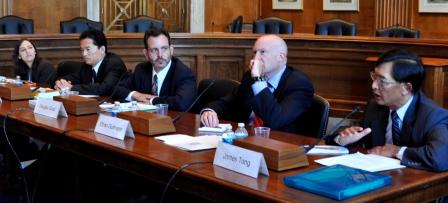ChinaAid
June 25, 2010
 |
| Mark Shan (2nd from left) in the CECC Panel |
WASHINGTON, D.C. — Mr. Mark Chuanhang Shan, a scholar on house churches in China, joined a panel of experts in analyzing the religious policies in China, at the roundtable forum hosted by Congressional-Executive Commission on China (CECC) on June 18. The two-hour afternoon discussion, also featuring James Tong, a professor of political science of Chinese descent from UCLA and two Western scholars from NGOs, touched on political and social trends influencing Chinese policies toward faith practitioners in country.
The CECC panel raised the following questions: “What factors have influenced the Chinese government’s policies toward spiritual movements and determined its various types of treatment toward members of the spiritual movements? The Chinese government allows some space for some spiritual movements to operate in while banning other movements, such as Falun Gong. Why does the Chinese government regard some spiritual movements as threats?”
In his speech, Mr. Shan emphasized that to understand the religious policies of the Chinese government, one must not overlook the influence from the traditional Chinese political culture. Since Zhou Dynasty, the concept of Mandate of Heaven has deeply influenced the religious policies of various dynasties in the history of China. This particular spiritual-political concept has passed down in the political-ideology of China’s history and influenced some political movements in modern China such as the Taiping Rebellion in the 19th century and the revolution for founding the Republic of China led by Sun Yat-sen in the early 20th century.
This tradition of political culture has led to a forbidden zone in the policies of the Chinese government: i.e. the government can’t tolerate dissent from any religion or spiritual movement. The government only allows those that obey the government and support the government’s political agendas. In today’s China, this type of political correctness is judged by the avowal of patriotism by the religious or spiritual groups. For example, the Protestant house churches and the underground Catholic churches are suppressed and persecuted by the government while Protestants and Catholics in the TSPM movement enjoy relatively more freedom. Likewise, some sects in various Qigong movements enjoy relatively more freedom while Falun Gong is severely cracked down because of their protest in front of the Xinhua Gate in Beijing (The Headquarter of Chinese Communist Party) on April 25, 1999 which touched the sensitive nerves in the politics. Among the slogans of Falun Gong movement, one is “Heaven shall wipe out the Chinese Communist Party.”
In fact, this is another interpretative application of the Mandate of Heaven.
Mr. Shan articulated this reaction the politicized nature of certain sects of Falun Gong as why Gao Zhisheng, the Christian attorney who led in defending the religious rights and human rights of some Falun Gong adherents, has suffered the most brutal persecution among many Christian rights defense attorneys.
CECC posited other questions regarding the broader, far-reaching implications of China’s current religious policies–asking the scholars to address what the Chinese government’s treatment of spiritual movements mean for the future of religious freedom in China.
Mr. Shan referenced the theory of Yang Fenggang, a famous Chinese sociologist and professor at Purdue University who proposed a “Triple-color Market Model” in describing the status of religion in contemporary China. The current religious policies in China have led to three markets — “a red market which is considered by the government as legal religions, a black market of banned religions, and a gray market where the religions have an ambiguous status between legal and illegal.
Because the Christian house churches’ interest in politics is ambiguous, they belong to the gray market. In addition to that, the house churches emphasize the teachings of “staying away from politics” and “praying for the state and the rulers.” As the disciples of Jesus Christ, house churches adhere to the teachings of “Blessed are they which are persecuted for righteousness’ sake: for theirs is the kingdom of heaven” and even “But I say unto you, Love your enemies, bless them that curse you, do good to them that hate you, and pray for them which despitefully use you, and persecute you.” With these teachings, they try to avoid challenging the authority of the government directly. Therefore, house churches in China will grow constantly and will gain more freedom of belief through legal means.
Finally, Mr. Shan pointed out that the development of Christianity in China (house churches and the government sanctioned TSPM churches) will deeply influence and promote the freedom of religion in China. In the final questions and answers, he predicted, based on the formation of civil societies and democratic societies and the experience of their development in the West, that the Christian house church movement, as a non-institutionalized religious cultural community, will surely promote the development and maturity of a citizen society in China and a citizen society is the cradle of a democratic society.
Mr. Mark Chuanhang Shan, with a background of house church in China, currently is enrolled in the doctoral program in philosophy, theology and ethics at Boston University.
Click here to read Mark Shan and the other panelists’ remarks on CECC website: http://cecc.gov/pages/roundtables/2010/20100618/index.php
Click here to download Shan Chuanhang’s written remarks – English
China Aid Contacts
Rachel Ritchie, English Media Director
Cell: (432) 553-1080 | Office: 1+ (888) 889-7757 | Other: (432) 689-6985
Email: [email protected]
Website: www.chinaaid.org